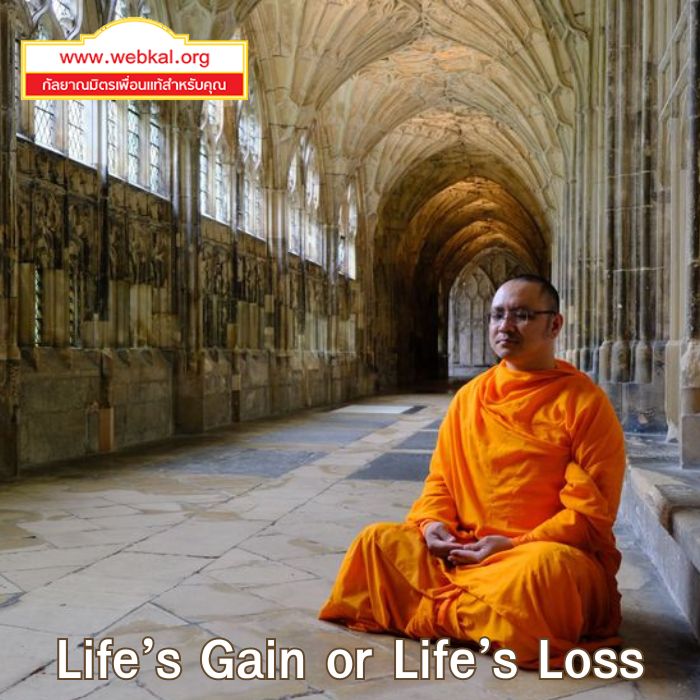
August 12, 2546 B.E.
Life’s Gain or Life’s Loss
Today is the day of brightness, the day of the full moon, and the Buddhist Holy Day. A third of this Rains-Retreat has already passed us by.This Rains-Retreat has been designated as the season for attaining the Dhamma. Everyone must endeavor to practice meditation so that he can attain the Dhamma. The Dhamma here means the Dhammakaya. He can be found inside every human being on earth regardless of his race or creed.
This is the Rains-Retreat where the monks can see the Dhammakaya, the novice monks can see the Dhammakaya, and the lay devotees can see the Dhammakaya. This is the season for seeing the Dhammakaya. It does not mean that everyone should see the Dhammakaya, but it means that everyone must see the Dhammakaya. Our time on earth is limited. Although the current average human lifespan is 75 years, but do not think that everyone will live that long. Some may die before then or around then. And some may live longer than 75 years; however, these are few in number. Most people die before they are 75 years old. Some people are still strong and healthy; they are not sick and they are not involved in a fatal accident, yet they can drop dead just like that.
Death can come to us anytime. One does not have to be an old person to die. Some die quite young. Therefore, to say that our time on earth is limited is an accurate statement. It is for this reason that all of us must spend the limited time we have in a worthwhile manner so that we can achieve gain in our life.Life’s gain or life’s loss depends on whether or not a person is constantly accumulating wholesomeness with his body, his words and his thoughts. If he is, then his life is full of gain. But if he is constantly accumulating unwholesomeness, then his life is full of loss. This is how the sages judge a person’s life.
Most people live their lives following the latest trends. Some say that they must live life to the fullest by getting drunk because they have a limited time on earth to get drunk. Some say that gambling is worthwhile. Some say that life is worthwhile only when they can have it all, alcohol, women, gambling, etc. Such are the opinions of those who have no idea why they are here. They have no idea about the past, the present, and the future. They have no idea about the existence of the Law of Kamma, the round of rebirth or the reality of life. It is for this reason the sages say,
Whatever gives rise to wholesomeness physically, verbally, and mentally is considered to be life’s gain. Whatever gives rise to unwholesomeness physically, verbally, and mentally is considered to be life’s loss.One must spend the limited time one has on earth doing what one can in order to achieve as much gain as possible. One must accumulate wholesomeness by pursuing the Ten Perfections and by practicing the Tenfold Wholesome Course of Action. In short, one must give alms, observe the Precepts, and practice meditation. One must endeavor to attain the Dhammakaya, to see His clear and bright body at all times whether one is closing or opening one’s eyes, whether one is sitting down,lying down, standing, walking, or doing a somersault. If one can see the Dhammakaya at all times, then one’s life is a life of gain indeed.
All of us are here to make clear the Path and Fruit of Nibbana. At least, one must continue to pursue Perfections to a greater extent than in previous existences to make one’s life on earth truly worthwhile. The Path and Fruit of Nibbana can be found inside one’s self and not in the sky, in the forest, in the mountain, in a distant star or anywhere else.It is often said that the time to attain Nibbana is long past. That statement is untrue because Nibbana is not outside of us but it is inside us. Nibbana can be found inside every human being.
The attainment of Nibbana is a timeless phenomenon or Akaliko. The instant one’s mind can be kept absolutely still and quiet, one will be able to attain the Dhammakaya. The Dhammakaya, in turn, leads one to Nibbana. Everyone and not just the monks or the monks who undertake Dhutanga (Austerity Practice) has
the same opportunity to attain the Dhamma. The statement that the Path and Fruit of Nibbana are untenable in this hi-tech age is not true because however hi-tech it may be, it is still a fact that the Path and Fruit of Nibbanacan be found inside each human being. The instant one can bring one’s mind to a complete standstill, one will be able to attain the Dhamma and achieve one’s ultimate life-goal as a human being. This is the truth.